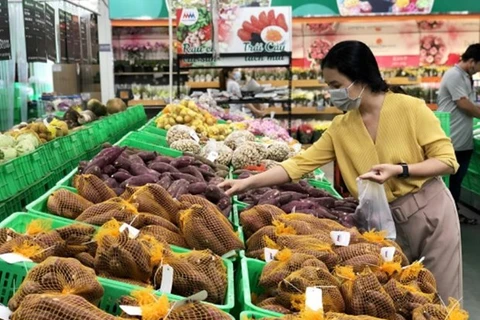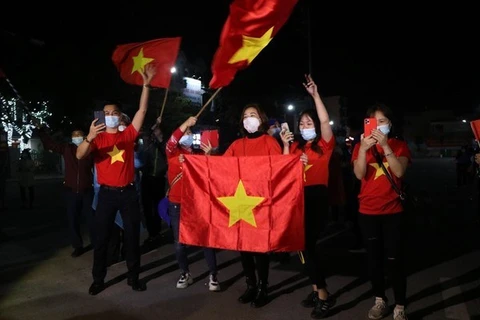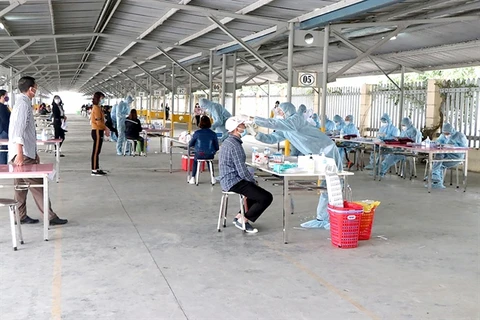Hanoi (VNA) - Consumption of goods and agricultural products nationwide has shown many problems that need to be resolved after the recent outbreak of COVID-19 pandemic.
Since the Lunar New Year, due to the complicated developments of the COVID-19 pandemic, many localities across the country have been struggling to sell their products. Activities to “rescue agricultural products" have been organised in many localities.
Many points for selling agricultural products from pandemic-hit areas have been established, receiving support of the people.
Although the activities have helped to consume a huge amount of farm produce for farmers, it has not shown economic efficiency.
Efforts to “rescue” farm produce
The northern province of Hai Duong, the hardest hit by the COVID-19 pandemic, was officially put under lockdown on February 16 as one of the measures to contain the spread of coronavirus, so local farmers have met difficulties in selling their products.
Also being affected by the pandemic, Hanoi and many provinces across the country have decided to close schools and non-essential services. Therefore, the demand for agricultural products and food for restaurants, hotels, schools and some other services has decreased sharply for a long time.
Vu Thi Nghiep, a farmer in Hanoi's surburn Me Linh district - a vegetable-growing area to provide for the capital city, said since the pandemic broke out again, many kinds of vegetables have not been sold or if they can be sold, the prices were very low.
Hundreds of tonnes of cabbage, lettuce, and cauliflower in Da Lat, the Central Highlands province of Lam Dong, red grapefruits of southern Dong Nai province, watermelons of the Central Highlands, dragon fruits of the south central province of Binh Thuan, and other agricultural products in other localities were also in the same situation.
In order to help farmers promote selling of their products, campaigns to “rescue” farm produce have been vigorously caried out in many localities. Individuals and volunteer groups connected with agricultural co-operatives, then transported products to locations of sale in Hanoi and other localities, thus helping farmers partly overcome difficulties.
The Vietnam Red Cross Society (VRCS) at all levels launched a campaign calling on domestic consumers to help farmers in the northern province of Hai Duong, who were struggling the COVID-19 pandemic with a huge amount of unsold farm produce.
The campaign is taking place from the end of February to mid-March. It is part of the support programme for COVID-19-affected people carried out by the VRCS in 13 cities and provinces which have recorded coronavirus community infections, namely Hai Duong, Quang Ninh, Gia Lai, Bac Ninh, Binh Duong, Hanoi, Bac Giang, Ho Chi Minh City, Hoa Binh, Ha Giang, Dien Bien, Hai Phong and Hung Yen.
More than 10 tonnes of agricultural products were sold at the launching ceremony of the campaign in Hanoi on February 23.
According to President of the VRCS Central Committee Nguyen Thi Xuan Thu, the VRCS Central Committee asked the red cross society in Hai Duong province to choose agricultural products that meet food safety standards, and transport them to the Central Committee as well as the red cross society in Hanoi for distribution.
In the past three days, more than 20 tonnes of farm produce have been purchased by consumers in Hanoi, she said, adding all of the products are strictly sterilised before they are sold.
According to Dang Kim Son, Director of the Institute of Agricultural Market and Institution Research, this is a great effort as a large scale “rescue” campaign was organised in a short time.
However, the passive 'rescue” is only a temporary solution as farmers still suffer great losses because their products cannot be sold in time, Son noted.
He said that although “rescue” activities are quite large and fast, but not systematical. Therefore, this is effective in terms of consumption but yet to bring economic efficiency to farmers.
Son also underlined the urgent need to set up authorised agencies to solve difficulties related to natural disasters and diseases, saying that Vietnam can learn from other countries in this issue.
Agricultural risk insurance is also an issue that needs to be considered in the future, he added./.
























